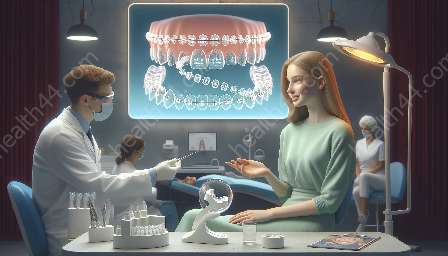Orthodontic treatment, including the use of clear aligners and Invisalign, can have a significant impact on a person's psychological and emotional well-being. This topic cluster will explore the emotional and psychological effects of undergoing orthodontic treatment, the benefits of clear aligners and Invisalign, and how individuals can cope with these changes.
The Emotional Journey of Orthodontic Treatment
Undergoing orthodontic treatment, such as wearing clear aligners or Invisalign, can trigger a range of emotions. Initially, some individuals may feel self-conscious about their appearance, especially if their treatment involves visible braces. They may experience anxiety or concerns about how their peers or colleagues will perceive them. These emotional responses are natural and understandable.
However, as the treatment progresses, many individuals begin to experience a noticeable shift in their emotions. As their teeth start to align and their smile transforms, feelings of excitement, pride, and confidence often emerge. This positive emotional change can be incredibly empowering, boosting the individual's self-esteem and perception of their overall appearance.
Psychological Impact of Orthodontic Changes
Orthodontic changes are not merely physical; they often have a profound psychological impact as well. A person's smile is a foundational aspect of their self-image, and adjustments to their dental alignment can significantly affect their self-perception. Individuals who have struggled with crooked or misaligned teeth may have developed self-esteem issues or avoided certain social situations due to insecurity about their smile.
By addressing these dental concerns through orthodontic treatment, individuals can experience a shift in their psychological well-being. They may feel more at ease in social interactions, smile more freely, and view themselves in a more positive light. As a result, the psychological benefits of orthodontic treatment extend beyond mere physical changes, influencing profound shifts in the individual's mindset and emotional state.
The Role of Clear Aligners and Invisalign
Clear aligners, such as Invisalign, have revolutionized orthodontic treatment by offering a discreet and convenient alternative to traditional braces. The psychological and emotional impact of clear aligners is particularly noteworthy, as they provide individuals with a more comfortable and aesthetically pleasing treatment option.
One of the key psychological benefits of clear aligners is the reduction of self-consciousness and social anxiety commonly associated with visible braces. Clear aligners allow individuals to undergo orthodontic treatment without drawing attention to their dental adjustments, enabling them to feel more confident and secure in their day-to-day interactions.
Furthermore, the flexibility and convenience of clear aligners contribute to a positive emotional experience for many individuals. Unlike traditional braces, clear aligners can be removed for eating, drinking, and dental hygiene, offering a sense of control and normalcy throughout the treatment process. This ability to maintain daily routines and appearance without the limitations of traditional braces can significantly impact the emotional well-being of those undergoing orthodontic treatment.
Coping with Orthodontic Changes
While the emotional and psychological impact of orthodontic treatment can be profound, there are various strategies individuals can employ to cope with these changes effectively. Building a support network of friends, family, and fellow individuals undergoing orthodontic treatment can provide valuable emotional support and understanding.
Additionally, embracing the transformative journey and maintaining a positive outlook can help individuals navigate the emotional fluctuations that accompany orthodontic changes. Setting realistic expectations and focusing on the long-term benefits of the treatment can empower individuals to stay resilient and optimistic throughout the process.
Self-care practices, such as engaging in activities that bring joy and relaxation, can also contribute to a positive emotional experience during orthodontic treatment. Seeking professional support from orthodontists, therapists, or counselors can offer valuable guidance and assistance in managing the emotional aspects of the treatment.
Conclusion
The psychological and emotional impact of orthodontic treatment, especially when considering the benefits of clear aligners and Invisalign, is a multifaceted journey that encompasses initial anxieties, transformative emotional shifts, and enhanced self-esteem. By exploring the emotional and psychological effects of orthodontic changes, individuals can gain a deeper understanding of the impact on their well-being and develop effective coping strategies to navigate this transformative process.


